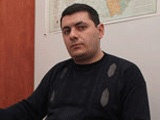|
|
TODAY.AZ / Politics
Armenian expert: Turkish Foreign Ministry tries to drag out ratification of Turkey-Armenia protocols
21 January 2010 [18:04] - TODAY.AZ
Day.Az interview with Armenian political expert, Deputy Director of the Caucasus Institute Sergey Minasyan.
 The Turkish Foreign Ministry has issued a statement criticizing the Armenia Constitutional Court decision declaring Turkish-Armenian protocols consistent with the Armenian Constitution. In your opinion, will the parliaments of both countries ratify the protocols?
The Turkish Foreign Ministry has issued a statement criticizing the Armenia Constitutional Court decision declaring Turkish-Armenian protocols consistent with the Armenian Constitution. In your opinion, will the parliaments of both countries ratify the protocols?The Armenian Constitutional Court decision is a prerequisite to submit them to the parliament for ratification. However, in political terms, statement of the Armenian Constitutional Court was accepted by Turks as an example of counter-pressure on Turkey.
In the meantime, by its statement the Turkish Foreign Ministry tries to drag out process of the protocols’s ratification in the country’s parliament owing to serious internal problems the Turkish government is facing.
Currently, however, the ratification of the Protocols depends not so much on domestic political development within Turkey or in Armenia, but on the outcome of multi-level negotiations between the world's leading players, match or mismatch of their positions, mutual influence and pressure on regional policy.
In other words, possible recognition of so-called "Armenian resolution" by the U.S. Congress on the eve of April 24 or Turkey’s EU admission influence the ratification more than failure of the “Kurdish initiative” by "Erdogan or backlash of the Turkish of opposition. So, probability of Turkish Parliament’s ratifying the protocols still remains while it is not serious problem for Armenia to ratify them following approval by the Constitutional Court.
Russian FM Sergey Lavrov visited Armenia a couple days ago. What does this visit mean given that it happened almost simultaneously with Turkish prime minister’s visit to Russia?
This visit scheduled back in December last year intended to discuss prospects of bilateral cooperation in all fields including humanitarian and military-political ones. Another thing is that Lavrov's visit also coincided with a very interesting and important stage in regional politics, especially intensification of the Armenian-Turkish process and expected ratification of the protocols in the parliaments.
Russia is actively promoting the Armenian-Turkish process, which is almost the only example of convergence of foreign policy interests of Moscow, Washington and Brussels in the post-Soviet area. So, consultations between the foreign ministers of both countries on a range of critical issues of regional policy were natural.
Turkish President Abdullah Gul has stated that Russia and Turkey are holding quiet, but very intensive diplomatic consultations with special emphasis on the Nagorno-Karabakh conflict. How do you comment on this statement?
Ankara and Moscow are constantly holding diplomatic consultations which is quite natural and understandable, because they are the two major regional powers. However, the Nagorno-Karabakh conflict is unlikely to be the main subject of consultation, not only in the context of Russia-Turkish bilateral relations, but also even during exchange of views between Russian and Turkish leaders on the Armenian-Turkish process as testified by outcomes of Erdogan's Moscow visit and latest public statements by Russian PM Putin and FM Lavrov.
What is Turkey's role in solving regional issues, in particular, the Karabakh conflict?
It depends on whether Turkey is ready to fully normalize relations with Armenia and reopen the borders without any preconditions in accordance with the provisions of the protocols. If Turkey's parliament ratifies the protocol within a reasonable time, Ankara will be able to play a more active role in the region promoting peaceful settlement of the Karabakh conflict.
If not, then Turkey will again remain outside our region, and its policy initiatives in the South Caucasus will not realized, as we have partly seen in connection with decline in importance of "Caucasus Platform" Ankara launched back in 2008.
How do you assess outcomes of the past year in terms of the settlement of the Nagorno-Karabakh conflict? Can we hope for a breakthrough on this issue in 2010 given the intensified high-level meetings?
The negotiation process will see some kind of dynamics, comparable to the dynamics of the past year. Possibly, certain documents and declarations with the participation of the conflicting sides will be adopted, but no comprehensive agreement on a final settlement will be reached.
URL: http://www.today.az/news/politics/59922.html
 Print version
Print version
Views: 1164
Connect with us. Get latest news and updates.
See Also
- 29 October 2025 [15:18]
Azerbaijan, Oman discuss deepening partnership during official talks - 29 October 2025 [11:57]
Azerbaijan–Belarus commission delegation visits Fuzuli and Agdam regions - 29 October 2025 [11:02]
Azerbaijani Foreign Minister meets Omani counterpart to boost bilateral cooperation - 28 October 2025 [16:16]
Crime without statute of limitations: five years since tragedy of Barda - 28 October 2025 [15:15]
Road exchange and its subtleties for Baku and Yerevan - 28 October 2025 [11:31]
President Ilham Aliyev visits cotton processing plant in Sabirabad Industrial Park - 28 October 2025 [11:08]
President Ilham Aliyev visits agrochemical production facility in Sabirabad - 28 October 2025 [09:50]
Pakistani Senate chairman visits Azerbaijan - 27 October 2025 [18:35]
Azerbaijan's Defense Minister meets UAE Special Operations Commander - 27 October 2025 [16:16]
Hello, I'm your aunt!
Most Popular
 Road exchange and its subtleties for Baku and Yerevan
Road exchange and its subtleties for Baku and Yerevan
 Baku has made another strong move in the regional game
Baku has made another strong move in the regional game
 Azerbaijan, UN sign new cooperation framework to advance sustainable development goals
Azerbaijan, UN sign new cooperation framework to advance sustainable development goals
 Media seminar held under EU4Energy project
Media seminar held under EU4Energy project
 BMU, INHA discuss results of Dual Degree Program monitoring
BMU, INHA discuss results of Dual Degree Program monitoring
 Azerbaijani choreographer passes away
Azerbaijani choreographer passes away
 ADB to support Baku Metro with $700,000 technical assistance for green transition
ADB to support Baku Metro with $700,000 technical assistance for green transition
